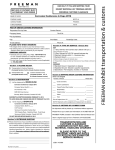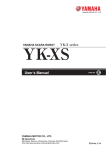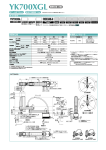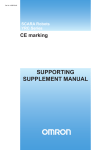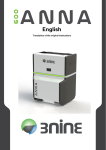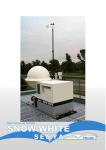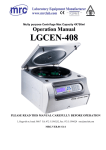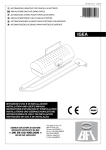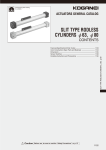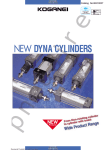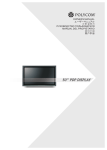Download R6Y - XS series User´s Manual
Transcript
Cat. No. I142E-EN-01 Cat. No. I142E-EN-01 SCARA Robots XS Series ZX-T Series R6Y - XS series SCARA Robots, R6Y - XS series USER´S MANUAL USER´S MANUAL Authorized Distributor: Cat. No. I142E-EN-01 Note: Specifications subject to change without notice. Printed in Europe Copyright The following shall be described in the Copyright section and the description shall not be changed without permission. OMRON, 2010 All rights reserved. No part of this publication may be reproduced, stored in a retrieval system, or transmitted, in any form, or by any means, mechanical, electronic, photocopying, recording, or otherwise, without the prior written permission of OMRON. No patent liability is assumed with respect to the use of the information contained herein. Moreover, because OMRON is constantly striving to improve its high-quality products, the information contained in this manual is subject to change without notice. Every precaution has been taken in the preparation of this manual. Nevertheless, OMRON assumes no responsibility for errors or omissions. Neither is any liability assumed for damages resulting from the use of the information contained in this publication. Introduction This user’s manual was prepared for XS series ceiling-hanging/inverse type models (R6YXSH300 to R6YXS1000) of the OMRON industrial robots. This user’s manual describes the safety measures, handling, adjustment and maintenance of XS series robots for correct, safe and effective use. Be sure to read this manual carefully before installing the robot. Even after you have read this manual, keep it in a safe and convenient place for future reference. This user’s manual should be used with the robot and considered an integral part of it. When the robot is moved, transferred or sold, send this manual to the new user along with the robot. Be sure to explain to the new user the need to read through this manual. For the operating or maintenance procedures not described in this manual, please refer to the separate “X Series User’s Manual”. Also refer to the “X Series User’s Manual” for precautions and warranty. If there are any obscure points in handling the robot, be sure to contact OMRON sales office or dealer. For details on specific operation and programming of the robot, refer to the separate “OMRON Robot Controller User’s Manual”. Disclaimers CHANGE IN SPECIFICATIONS Product specifications and accessories may be changed at any time based on improvements and other reasons. It is our practice to change model numbers when published ratings or features are changed, or when significant construction changes are made. However, some specifications of the products may be changed without any notice. When in doubt, special model numbers may be assigned to fix or establish key specifications for your application on your request. Please consult with your OMRON representative at any time to confirm actual specifications of purchased products. DIMENSIONS AND WEIGHTS Dimensions and weights are nominal and are not to be used for manufacturing purposes, even when tolerances are shown. PERFORMANCE DATA Performance data given in this manual is provided as a guide for the user in determining suitability and does not constitute a warranty. It may represent the result of OMRON’s test conditions, and the users must correlate it to actual application requirements. Actual performance is subject to the OMRON Warranty and Limitations of Liability. ERRORS AND OMISSIONS The information in this manual has been carefully checked and is believed to be accurate; however, no responsibility is assumed for clerical, typographical, or proofreading errors, or omissions. CONTENTS CHAPTER 1 Functions 1 Robot Manipulator...............................................................1-1 2 Robot Parameters.................................................................1-4 CHAPTER 2 Installation 1 Installation Base...................................................................2-1 2 Installation............................................................................2-2 2-1 Unpacking.......................................................................................................... 2-2 2-2 Checking the product.......................................................................................... 2-3 2-3 Moving the robot................................................................................................ 2-4 2-3-1 Moving the R6YXSH300, R6YXSH400............................................................. 2-4 2-3-2 Moving the R6YXS500, R6YXS600, R6YXS700, R6YXS800, R6YXS1000.. 2-5 2-3-2-1 Moving the ceiling-hanging robot...................................................... 2-5 2-3-2-2 Moving the inverse type robot......................................................... 2-10 CHAPTER 3 Periodic Inspection 1 Replacing the Harmonic Grease (Inverted ceiling-hanging/inverse type model R-axis).........3-1 1-1 Replacement period............................................................................................ 3-1 CHAPTER 4 Specifications 1 Robot Manipulator...............................................................4-1 1-1 Basic specifications............................................................................................ 4-1 1-2 External view and dimensions............................................................................ 4-4 CHAPTER 1 Functions 1 Robot Manipulator............................................................................. 1-1 2 Robot Parameters............................................................................... 1-4 CHAPTER 1 Functions 1 Robot Manipulator XS series robots are grouped into the ceiling-hanging models of Fig. 1-1 and the inverse type models of Fig. 1-2. Jog key movement is in the directions shown in Figs. 1-1 and 1-2. Robot part names and functions are shown in Fig. 1-3 and Fig. 1-4. Fig. 1-1 Ceiling-hanging models Fig. 1-2 Inverse type models 1-1 CHAPTER 1 Functions User tubing 1 (φ4 black) User tubing 2 (φ4 red) User tubing 3 (φ4 blue) M4 ground terminal Serial label D-sub connector for user wiring (No.1 to 10) D-sub connector for user wiring (No.1 to 10) Machine harness User tubing 1 (φ4 black) User tubing 2 (φ4 red) User tubing 3 (φ4 blue) Ball screw Robot cable Warning label 1 Warning label 3 Warning label 2 R-axis motor X-axis motor Z-axis motor Y-axis motor X-axis speed reduction gear Y-axis arm R-axis speed reduction gear Z-axis spline End effector attachment Y-axis speed reduction gear Y-axis mechanical stopper X-axis mechanical stopper X-axis arm Z-axis,R-axis pulley, belt Fig. 1-3 R6YXSH300, R6YXSH400 ceiling-hanging/inverse type robots In the case of the ceiling-hanging/inverse type models, the robot base up/down installation directions in the figure are reversed. 1-2 CHAPTER 1 Functions Y-axis mechanical stopper User tubing 2 (φ6 red) User tubing 3 (φ6 blue) D-sub connector for user wiring (No.1 to 20) User tubing 1 (φ6 black) Robot cable Warning label 2 (Same on opposite side) Warning label 1 (Same on opposite side) Ball screw User tubing 3 (φ6 blue) User tubing 2 (φ6 red) User tubing 1 (φ6 black) D-sub connector for user wiring (No.1 to 20) M4 ground terminal Machine harness Serial label R-axis motor Z-axis motor Y-axis motor Warning label 3 X-axis motor Y-axis speed reduction gear R-axis speed reduction gear Z-axis spline X-axis speed reduction gear Y-axis arm Z-axis,R-axis pulley, belt End effector attachment X-axis arm Carrying jig installation position Machine harness X-axis movable mechanical stopper Fig. 1-4 R6YXS500 to R6YXS1000 ceiling-hanging/inverse type robots In the case of the ceiling-hanging/inverse type models, the robot base up/down installation directions in the figure are reversed. 1-3 CHAPTER 1 Functions 2 Robot Parameters A portion of the robot parameters for ceiling-hanging/inverse type models are changed from the standard specifications when shipped. The following is a description of these changed parameters and precautions you should take when using these robots. To purchasers of this robot At this time our sincere thanks for your purchase of this robot. This robot is made to custom specifications so some parameters are different from standard robots. Please be aware of the following points before attempting to use the robot. Cautions regarding use Always make a backup of parameters. Initializing the parameters voids all parameters that were entered. When initialized, load the backup parameters. Parameter changes A description of parameter changes is given below. Boxes left blank indicate standard specifications. (1) Ceiling-hanging model Axis settings Parameter Axis parameters 16. Motor direction Changes Y-axis Z-axis R-axis X-axis Changes Y-axis Z-axis +++ R-axis --- Axis settings (R6YXSH300, R6YXSH400) Parameter X-axis Axis parameters 37. Max. motor rotation Changes Y-axis Z-axis X-axis +++ (2) Inverse type models Axis settings Parameter Axis parameters 16. Motor direction Axis settings (R6YXS500, R6YXS600, R6YXS700, R6YXS800, R6YXS1000) Parameter Changes X-axis Y-axis Z-axis Axis parameters 37. Max. motor rotation 1-4 R-axis 6000 R-axis 4000 CHAPTER 1 Functions (3) R6YXSH300 Axis settings Parameter Axis parameters 11. Arm length [mm] X-axis 175.00 Changes Y-axis Z-axis 125.00 Robot numbers used to initialize the parameters are as follows Robot numbers 2101 2102 2103 2104 2105 2106 2107 2110 2111 2112 2113 2114 Robot model R6YXSH300 R6YXSH400 R6YXS500 Z200 R6YXS600 Z200 R6YXS700 Z200 R6YXS800 Z200 R6YXS1000 Z200 R6YXS500 Z300 R6YXS600 Z300 R6YXS700 Z400 R6YXS800 Z400 R6YXS1000 Z400 Manufacturer serial No. Controller serial No. 1-5 R-axis CHAPTER 2 Installation 1 Installation Base................................................................................. 2-1 2 Installation.......................................................................................... 2-2 2-1 2-2 2-3 Unpacking................................................................................................................. 2-2 Checking the product................................................................................................ 2-3 Moving the robot....................................................................................................... 2-4 2-3-1 Moving the R6YXSH300, R6YXSH400.................................................................. 2-4 2-3-2 Moving the R6YXS500, R6YXS600, R6YXS700, R6YXS800, R6YXS1000........ 2-5 2-3-2-1 Moving the ceiling-hanging robot............................................................. 2-5 2-3-2-2 Moving the inverse type robot................................................................. 2-10 CHAPTER 2 Installation 1 Installation Base 1) Please read the description of standard robot models for the installation base and comply with the caution items provided. WARNING THE CEILING-HANGING/INVERSE TYPE ROBOT MODELS ARE HUNG FROM THE CEILING SO A DANGEROUS SITUATION CAN OCCUR IF THE ROBOT SUPPORT SECTION BREAKS AND THE ROBOT FALLS. MAKE SURE THE ROBOT SUPPORT SECTION HAS SUFFICIENT STRENGTH, RIGIDITY AND SAFETY. CAUTION •WHEN USING THE R6YXSH300 AND R6YXSH400, MAKE SURE THAT THE ARM DOES NOT INTERFERE WITH THE BASE INSTALLATION SECTION. •WHEN USING THE R6YXS500 TO R6YXS1000, MAKE SURE THAT THE MACHINE HARNESS AND Y-AXIS ARM UPPER COVER DO NOT INTERFERE WITH THE BASE INSTALLATION SECTION. SEE “1-2 EXTERNAL VIEW AND DIMENSIONS” IN CHAPTER 4. 2) Tap the required holes into the surface of the installation base. See “1-2 External view and dimensions” in Chapter 4 for how to tap the holes. 2-1 CHAPTER 2 Installation 2 Installation 2-1 Unpacking WARNING THE ROBOT AND CONTROLLER ARE HEAVY. TAKE SUFFICIENT CARE NOT TO DROP THEM DURING MOVING OR UNPACKING AS THIS MAY DAMAGE THE EQUIPMENT OR CAUSE BODILY INJURY. CAUTION WHEN MOVING THE ROBOT OR CONTROLLER BY EQUIPMENT SUCH AS A FOLK-LIFT THAT REQUIRES A LICENSE, ONLY PROPERLY QUALIFIED PERSONNEL MAY OPERATE IT. THE EQUIPMENT AND TOOLS USED FOR MOVING THE ROBOT SHOULD BE SERVICED DAILY. The XS series robot comes packed with a robot controller and accessories, according to the order specifications. Using a carrying cart (dolly) or forklift, move the package to near the installation base. Take sufficient care not to apply shocks to the equipment when unpacking it. Robot manipulator R6YXS500, R6YXS600, R6YXS700, R6YXS800, R6YXS1000 Ceiling-hanging models Case Robot manipulator R6YXSH300, R6YXSH400 Arm clamping stay (Remove after installation.) Robot carrying jig Arm clamping stay (Remove after installation.) Robot controller and accessories Robot manipulator R6YXS500, R6YXS600, R6YXS700, R6YXS800,R6YXS1000 Inverse type models Fig. 2-1 Packed state 2-2 CHAPTER 2 Installation 2-2 Checking the product After unpacking, check the product configuration and conditions. The illustration below shows typical configurations for R6YXS500 to R6YXS1000 ceiling-hanging/inverse type models, which are different from standard models. CAUTION IF THERE IS ANY DAMAGE DUE TO TRANSPORTATION OR INSUFFICIENT PARTS, PLEASE NOTIFY YOUR OMRON SALES OFFICE OR DEALER IMMEDIATELY. Controller : YRC v.1 Robot : R6YXS500, R6YXS600, R6YXS700, R6YXS800, R6YXS1000 STD. DIO connector (x1) PB terminator (x1) CD-ROM User’s Manual or User’s Manual Warning label (x1) Robot manipulator XS series OP.1 MO TOR OP.3 D-sub connector/hood (x2) YRC PB PWR SRV ERR XM ROB I/O XY SE L YM T B AT XY COM ROB I/O OP.2 .DIO STD B AT ZR OP.4 A X Z P N ZR ZM T ACIN L B Y R Origin position stickers (x2) (R6YXS500,R6YXS600 x3) N Y E T SAF L1 N1 RM Covers (x2) TOP 14 EX T.E-S 13− PIN YRC robot controller Screws (x4) Fig. 2-2 Product configurations 2-3 CHAPTER 2 Installation 2-3 Moving the robot WARNING SERIOUS INJURY MAY OCCUR IF THE ROBOT FALLS AND PINS SOMEONE UNDER IT. •DO NOT ALLOW ANY PART OF YOUR BODY TO ENTER THE AREA BENEATH THE ROBOT DURING WORK. •ALWAYS WEAR A HELMET, SAFETY SHOES AND GLOVES DURING WORK. To check the mass of each robot, refer to “1-1 Basic specifications” in Chapter 4. 2-3-1 Moving the R6YXSH300, R6YXSH400 1) Fold the X and Y axis arms as shown in Fig. 2-3, and wind the robot cable around the machine harness, then fasten the robot cable with adhesive tape so as not to cover the bolt installation holes. When moving an inverted ceiling-hanging robot, wind the robot cable around the spline shaft as shown and fasten the cable with adhesive tape. 2) Holding the support parts as shown in the figure with both hands, place the robot on the installation base and secure it temporarily by tightening the bolts. (For tightening torque to secure the robot firmly, see “2-4 Installing the robot” in the X standard model user’s manual.) Robot cable Robot cable Bolt installation hole Support part Support part Support part Bolt installation hole Support part Fig. 2-3 2-4 CHAPTER 2 Installation 2-3-2 Moving the R6YXS500, R6YXS600, R6YXS700, R6YXS800, R6YXS1000 WARNING SERIOUS INJURY MAY OCCUR IF THE ROBOT FALLS AND PINS SOMEONE UNDER IT. •CHECK THAT THERE ARE NO CRACKS AND CORROSION ON THE EYEBOLT INSTALLATION. IF FOUND, DO NOT USE EYEBOLTS TO MOVE THE ROBOT. •INSERT THE EYEBOLTS INTO THE HOLES OF THE CARRYING JIG SO THAT THEIR BEARING SURFACES MAKE TIGHT CONTACT WITH EACH OTHER, AND SECURELY FASTEN THE EYEBOLTS WITH THE NUTS. •USE A HOIST AND ROPE WITH CARRYING CAPACITY STRONG ENOUGH TO SUPPORT THE ROBOT WEIGHT. •MAKE SURE THE ROPE STAYS SECURELY ON THE HOIST HOOK. •REMOVE ALL LOADS ATTACHED TO THE ROBOT MANIPULATOR END. IF ANY LOAD IS STILL ATTACHED, THE ROBOT MAY LOSE BALANCE WHILE BEING CARRIED, AND TOPPLE OVER CAUSING ACCIDENTS. CAUTION •WHEN MOVING THE ROBOT BY EQUIPMENT SUCH AS CRANES THAT REQUIRE A LICENSE, ONLY PROPERLY QUALIFIED PERSONNEL MAY OPERATE IT. •THE EQUIPMENT AND TOOLS USED FOR MOVING THE ROBOT SHOULD BE SERVICED DAILY. To move a robot (for example, the R6YXS500) correctly and safely, follow the procedure below. Use the same procedure to move other robots. 2-3-2-1 Moving the ceiling-hanging robot (1) When using eyebolts (See Fig. 2-4.) 1) Remove the X-axis and Y-axis under covers and attach the carrying jigs as shown in Fig. 2-4. Remove all loads if attached to the Z-axis to set the servo free and release the brake. Then fold the Z-axis to a position where it can be fastened to the arm clamping stay. 2) Insert the eyebolts into the holes on the carrying jig and securely fasten the eyebolts with the nuts. Then attach the arm clamping stay to the carrying jig. 2-5 CHAPTER 2 Installation 3) Clamp the Y-axis arm by using the stay and bolts that come with the robot. If the arms cannot be folded in the carrying position (see Fig. 2-4) due to the X-axis mechanical stoppers, then remove them. (When the robot is shipped, the mechanical stoppers are installed to provide the maximum movement range.) 4) Wind the robot cable around the robot base while keeping the cable from hanging up on the base mount, then fasten the cable end with adhesive tape. 5) Prepare 4 looped ropes with the same length to allow a good lifting balance, then pass each rope through each eyebolt and catch it on the hoist hook. 6) Slightly lift the hoist so that each rope has light tension to hold the robot. In this state, remove the bolts securing the robot base to the pallet supplied or installation base (if robot is to be moved to another installation base). 7) Using caution to keep the balance of the robot and avoid subjecting it to any strong vibrations and shocks, operate the hoist carefully to move to the installation base. The angle between each rope and the arm surface should be kept at 45 degrees or more. 8) Temporarily secure the robot to the installation base by tightening the bolts. (Use the same tightening torque as specified to secure the standard model robots.) 9) Remove the ropes and carrying jigs, then reattach the X-axis and Y-axis under covers. Be sure to keep the carrying jigs, eyebolts, arm clamping stay, bolts and pallet for future use in case the robot needs to be moved or transported. 2-6 CHAPTER 2 Installation Arm clamping stay (supplied with robot) Eyebolts (4 pieces supplied with the robot) Arm clamped position Bolts (M12x20) supplied with robot Tightening torque 71N•m (720kgf•cm) Hoist hook Rope Robot cable Use bolts and nuts or screws (4 pcs) supplied with robot 4 bolts (supplied with robot) Tightening torque 71N•m (720kgf•cm) Robot carrying jig Pallet (supplied with the robot) Bolts (2 pcs) supplied with robot Tightening torque 4.5N•m (46kgf•cm) Y-axis under cover Fig. 2-4 2-7 Screw X-axis under cover CHAPTER 2 Installation (2) When using the hand forklift (See Fig. 2-5) 1) Remove the X- and Y-axis under covers and install the robot carrying jigs. 2) Set the X- and Y-axis arms straight (See Fig. 2-5). If the robot is in the shipped state, remove the spline from the arm clamping stay, and set the X- and Y-axis arms straight. If the arms cannot be folded in the carrying position (see Fig. 2-5) due to the X-axis mechanical stoppers, then remove them. 3) Wind the robot cable around the robot base while keeping the cable from hanging up on the base mount, then fasten the cable end with adhesive tape. 4) Insert the prongs of the hand forklift into the robot carrying jigs and raise the hand forklift supporting the robot. Remove the bolts securing the pallet supplied or installation base (if moving the robot to another installation base). 5) Using caution to keep the balance of the robot and avoid subjecting it to vibrations and shocks, slowly move to the installation base. 6) Temporarily secure the robot to the installation base by tightening the bolts. (Bolt tightening torque is the same as the standard model robots.) 7) Remove the carrying jigs, and reattach the X- and Y-axis under covers. Be sure to keep the carrying jigs, bolts, arm clamping stay and pallet for future use in case the robot needs to be moved or transported. 2-8 CHAPTER 2 Installation Set the arms out straight. Arm clamping stay (supplied with robot) Arm clamped position Bolts (M12x20) supplied with robot Robot cable 4 bolts (supplied with robot) Tightening torque 71N•m (720Kgf•cm) Use bolts and nuts or screws (4 pcs) supplied with robot Robot carrying jig Insert the prongs of the hand forklift there. Pallet (supplied with the robot) Bolts (2 pcs) supplied with robot Y-axis under cover Fig. 2-5 2-9 Screw X-axis under cover CHAPTER 2 Installation 2-3-2-2 Moving the inverse type robot (1) When using eyebolts (See Fig. 2-6.) 1) Remove the X-axis and Y-axis upper covers and attach the robot carrying jigs. Remove all loads if attached to the Z-axis to set the servo free and release the brake. Then fold the Z-axis to a position where it can be fastened to the arm clamping stay 2) Insert the eyebolts into the holes on the carrying jigs and securely fasten the eyebolts with the nuts. Then attach the arm clamping stay to the carrying jigs. 3) Clamp the Y-axis arm by using the stay and bolts that come with the robot. If the arms cannot be folded in the carrying position (see Fig. 2-4) due to the X-axis mechanical stoppers, then remove them. (When the robot is shipped, the mechanical stoppers are installed to provide the maximum movement range.) 4) Wind the robot cable around the robot base while keeping the cable from hanging up on the base mount, then fasten the cable end with adhesive tape. 5) Prepare 4 looped ropes with the same length to allow a good lifting balance, then pass each rope through each eyebolt and catch it on the hoist hook. 6) Slightly lift the hoist so that each rope has light tension to hold the robot. In this state, remove the bolts securing the robot base to the pallet supplied or installation base (if moving the robot to another installation base). 7) Using caution to keep the balance of the robot and avoid subjecting it to any strong vibrations and shocks, operate the hoist carefully to move to the installation base. The angle between each rope and the arm surface should be kept at 45 degrees or more. 8) Temporarily secure the robot to the installation base by tightening the bolts. (Bolt tightening torque is the same as the standard model robots.) 9) Remove the ropes and carrying jigs, then reattach the X-axis and Y-axis upper covers. Be sure to keep the carrying jigs, eyebolts, arm clamping stay, bolts and pallet for future use in case the robot needs to be moved or transported. 2-10 CHAPTER 2 Installation Hoist hook X-axis upper cover Y-axis upper cover Rope Screw Eyebolts (4 pieces supplied with the robot) 2 bolts (supplied with robot) Tightening torque 4.5N•m (46kgf•cm) Robot carrying jig 4 bolts (supplied with robot) Tightening torque 71N•m (720kgf•cm) Robot cable Use bolts and nuts or screws supplied with robot Pallet (supplied with the robot) Bolts (M12×20) supplied with robot Tightening torque 71N•m (720kgf•cm) Arm clamping stay (supplied with robot) Arm clamped position Fig. 2-6 2-11 CHAPTER 2 Installation (2) When using the hand forklift (See Fig. 2-7) 1) Remove the X- and Y-axis upper covers and install the robot carrying jigs. 2) Set the X- and Y-axis arms straight (See Fig. 2-5). If the robot is in the shipped state, remove the spline from the arm clamping stay, and set the X- and Y-axis arms straight. If the arms cannot be folded in the carrying position (see Fig. 2-5) due to the X-axis mechanical stoppers, then remove them. (When the robot is shipped, the mechanical stoppers are installed to provide the maximum movement range.) 3) Wind the robot cable around the robot base while keeping the cable from hanging up on the base mount, then fasten the cable end with adhesive tape. 4) Insert the prongs of the hand forklift into the robot carrying jigs and raise the hand forklift supporting the robot. Remove the bolts securing the pallet supplied or installation base (if moving the robot to another installation base). 5) Using caution to keep the balance of the robot and avoid subjecting it to vibrations and shocks, slowly move to the installation base. 6) Temporarily secure the robot to the installation base by tightening the bolts. (Bolt tightening torque is the same as the standard model robots.) 7) Remove the carrying jigs, and reattach the X- and Y-axis upper covers. Be sure to keep the carrying jigs, bolts, arm clamping stay and pallet for future use in case the robot needs to be moved or transported. 2-12 CHAPTER 2 Installation X-axis upper cover Y-axis upper cover Screw Eyebolts (4 pieces supplied with the robot) 2 bolts (supplied with robot) Insert the prongs of the hand forklift there. Insert the prongs of the hand forklift there. Robot carrying jig 4 bolts (supplied with robot) Tightening torque 71N•m (720kgf•cm) Robot cable Use bolts and nuts or screws supplied with robot Pallet (supplied with the robot) Bolts (M12×20) supplied with robot Arm clamping stay (supplied with robot) Set the arms out straight. Arm clamped position Fig. 2-7 2-13 CHAPTER 3 Periodic Inspection 1 Replacing the Harmonic Grease (Inverse type model R-axis)........... 3-1 1-1 Replacement period................................................................................................... 3-1 CHAPTER 3 Periodic Inspection 1 Replacing the Harmonic Grease (Inverse type model R-axis) Only the R-axis harmonic drive of the inverse type model uses harmonic grease HC-1A. This grease must be replaced periodically. Use the guideline explained below to determine the appropriate replacement period and replace the grease. 1-1 Replacement period The harmonic drive grease replacement period is determined by the total number of turns of the wave generator used in the harmonic drive. It is recommended to replace the harmonic drive grease when the total number of turns has reached 1.5×108 (at ambient operating temperatures of 0°C to +40°C). This means that the replacement period will differ depending on the following operating conditions. If the robot operation duty ratio is high or the robot is operated in environments at higher temperatures, the harmonic drive should be replaced earlier. Replacement period= 1.5×108/(n×60×h×D×N×θ) years where n : Number of axis movements per minute θ : Average turn per axis movement N : Speed reduction ratio h : Operation time per day D : Operation days per year For example, when the robot is used under the following conditions, the replacement period for the R-axis harmonic drive grease of the R6YXS500 can be calculated as follows. n : 10 θ : 0.25 N : 80 h : 24 hours per day D : 240 days per year Replacement period= 1.5×108/(n×60×h×D×N×θ) = 1.5×108/(10×60×24×240×80×0.25) = 2.17 years Table 3-1 Harmonic drive speed reduction ratio Robot model R6YXSH300, R6YXSH400 R-axis 50 R6YXS500, R6YXS600 50 R6YXS700, R6YXS800 50 R6YXS1000 50 3-1 CHAPTER 4 Specifications 1 Robot Manipulator............................................................................. 4-1 1-1 1-2 Basic specifications................................................................................................... 4-1 External view and dimensions.................................................................................. 4-4 CHAPTER 4 Specifications 1 Robot Manipulator 1-1 Basic specifications Robot model R6YXSH300 R6YXSH400 Arm length 175mm 225mm Rotation angle ±115° ±115° Arm length 125mm 175mm Rotation angle ±140° ±140° Z-axis Stroke 150mm 150mm R-axis Rotation angle ±180° ±180° X-axis 200W 200W Y-axis 100W 100W Z-axis 100W 100W R-axis 100W 100W XY resultant 4.4m/s 6.0m/s Z-axis 1.0m/s 1.0m/s R-axis 1020°/s 1020°/s XY-axes ±0.01mm ±0.01mm Z-axis ±0.01mm ±0.01mm R-axis ±0.005° ±0.005° 3kg 3kg X-axis Axis Y-axis specifications Motor Maximum speed Repeatability *1 Payload R-axis tolerable moment of inertia *2 User wiring 0.05kgm2 (0.5kgfcms2) 10 cables 10 cables 4x3 4x3 User tubing (Outer diameter) Travel limit 1.Soft limit 2.Mechanical limit (XYZ-axes) Robot cable 3.5m (option: 5m, 10m) Weight 15kg *1 At constant ambient temperature (XY) *2 There are limits to acceleration coefficient settings. 4-1 15kg CHAPTER 4 Specifications Robot model R6YXS500 R6YXS600 Arm length 250mm 350mm Rotation angle ±120° ±120° Arm length 250mm 250mm Rotation angle ±135° ±145° Z-axis Stroke 200,300mm 200,300mm R-axis Rotation angle ±180° ±180° X-axis 400W 400W Y-axis 200W 200W Z-axis 200W 200W R-axis 100W 100W XY resultant 4.9m/s 5.6m/s Z-axis 1.7m/s 1.7m/s X-axis Axis specifi- Y-axis cations Motor Maximum speed Repeatability *1 R-axis 876°/s 876°/s XY-axes ±0.02mm ±0.02mm Z-axis ±0.01mm ±0.01mm R-axis ±0.005° ±0.005° 10kg 10kg Payload R-axis tolerable moment of inertia *2 User wiring 0.12kgm2 (1.2kgfcms2) 20 cables 20 cables 6x3 6x3 User tubing (Outer diameter) Travel limit 1.Soft limit 2.Mechanical limit (XYZ-axes) Robot cable 3.5m (option: 5m, 10m) Weight 30kg *1 At constant ambient temperature (XY) *2 There are limits to acceleration coefficient settings. 4-2 32kg CHAPTER 4 Specifications Robot Model X-axis Axis specifications Y-axis Z-axis Arm length R6YXS800 R6YXS1000 350mm 450mm 550mm Rotation angle ±120° ±120° ±120° Arm length 350mm 350mm 450mm Rotation angle ±145° ±145° ±145° Stroke 200,400mm 200,400mm 200,400mm ±180° ±180° ±180° X-axis 800W 800W 800W Y-axis 400W 400W 400W R-axis Rotation angle Motor R6YXS700 Z-axis 400W 400W 400W R-axis 200W 200W 200W XY resultant 6.7m/s 7.3m/s 8.0m/s Maximum speed Z-axis 1.7m/s 1.7m/s 1.7m/s R-axis 600°/s 600°/s 600°/s Repeatability *1 X,Y-axes ±0.02mm ±0.02mm ±0.02mm Z-axis ±0.01mm ±0.01mm ±0.01mm R-axis ±0.005° ±0.005° ±0.005° 20kg 20kg Payload R-axis tolerable moment of inertia *2 User wiring User tubing (Outer diameter) 20kg 0.32kgm (3.2kgfcms ) 2 2 20 cables 20 cables 20 cables 6x3 6x3 6x3 Travel limit 1.Soft limit 2.Mechanical limit (XYZ-axes) Robot cable 3.5m,option:5m,10m Weight 56kg 57kg At constant ambient temperature (XY) *12 There are limits to acceleration coefficient settings. * 4-3 58kg CHAPTER 4 Specifications 1-2 External view and dimensions The drawing below is for the ceiling-hanging robots. The inverse type robots also have the same dimensions. 37 112.2 175 42 D-sub connector for user wiring (No.1 to 10) 0 38 R5 D-sub connector for user wiring (No.1 to 10) M4 ground terminal 131 140 65 74 55 13 100 125 12 5 9. User tubing 1 (φ4 black) R3 User tubing 2 (φ4 red) User tubing 3 (φ4 blue) User tubing 1 (φ4 black) 40 User tubing 2 (φ4 red) 72 User tubing 3 (φ4 blue) 103 381 290 230 187 0 15 36 φ54 4-φ9 Use M8 bolt for installation 62 52 φ31 142±2 150 Z-axis stroke 0 φ16h7 -0.018 M8×1.25 Depth 15 Fig. 4-1 R6YXSH300 4-4 135 25 185.5 168 120 CHAPTER 4 Specifications (Use this when tightening M8 φ3 +0.2 0 screw at lower part.) Z-axis mechanical stopper 41 36(φ16 Range) Circlip for user tool positioning Spline shaft (hollow) Hollow diameter φ7 0 φ16h7 -0.018 M8×1.25 Depth15 Z-axis tip shape ° 140 5° 11 5° ° 11 140 R3 13 00 R1 R1 25 86° 86° 226 Base interference range Working envelope Use caution to prevent interference with installation wall Inverse type is installed upside down. 4-5 CHAPTER 4 Specifications 37 166.1 225 42 D-sub connector for user wiring (No.1 to 10) M4 ground terminal 131 D-sub connector for user wiring (No.1 to 10) 140 74 55 13 65 175 100 R5 0 38 12 User tubing 1 (φ4 black) R3 9. 5 User tubing 1 (φ4 black) User tubing 2 (φ4 red) User tubing 2 (φ4 red) User tubing 3 (φ4 blue) User tubing 3 (φ4 blue) 40 72 103 381 290 230 187 φ54 0 15 4-φ9 36 Use M8 bolt for installation 62 52 φ31 1150 Z-axis stroke 142±2 φ16h7 0 -0.018 M8×1.25 Depth 15 Fig. 4-2 R6YXSH400 4-6 135 25 185.5 168 120 CHAPTER 4 Specifications (Use this when tightening M8 φ3 +0.2 0 screw at lower part.) Z-axis mechanical stopper 41 36(φ16 Range) Circlip for user tool positioning Spline shaft (hollow) Hollow diameter φ7 0 φ16h7 -0.018 M8×1.25 Depth15 Z-axis tip shape 5° 45 00 R1 5° 11 11 0° 14 0° 14 R4 96° 226 96° Base interference range Working envelope Use caution to prevent interference with installation wall Inverse type is installed upside down. 4-7 CHAPTER 4 Specifications 47 250 120 250 90 94 User tubing 3 (ø6 blue) R55 User tubing 2 (ø6 red) D-sub connector for user wiring (No.1 to 20) User tubing 1 (ø6 black) ø205 (Installation base of larger than ø205mm may interfere with harness.) 228 Z300mm stroke Recommended user installation base 93 Z200mm stroke 60 8 0 15 91 36 2X2-M4X0.7 Depth10 (Same on opposite side) 284 Z-axis upper end mechanical stopper position 54 20 319 ø7 8 411±2 0 ø18 -0.018 A 200 M12x1.75 Depth 20 86 Z-axis300mm stroke Working envelope Center of recommended user installation base 110 R200 65 70 12 12 R2 0 R80 Z-axis200mm stroke Working envelope Z-axis lower end mechanical stopper position 65 300 517 160 41 48 364 8 57 73 166 (Base size) View from direction A Fig. 4-3 R6YXS500 4-8 4-ø11 Use M10 bolt for installation CHAPTER 4 Specifications 0˚ 12 R1 91 0˚ Interference position (a) Base flange (b) Base rear side (c) Base 0 R50 12 ) R93(a R111(c) 0 R25 (b) R67 135˚ 135˚ 3(c) R18 3 R10 ) 5(a R8 ˚ 122 0 R50 122 ˚ Working envelope R250 R59(b) 137˚ 137˚ X and Y-axis mechanical stopper positions (maximum working envelope) 2 0 0 35 55 73 53 User tubing 3(ø6 blue) D-sub connector for user wiring (No.1 to 20) User tubing 2(ø6 red) User tubing 1(ø6 black) M4 ground terminal 4-9 CHAPTER 4 Specifications User tubing 2 (ø6 red) 120 94 User tubing 3 (ø6 blue) 350 90 250 R55 47 D-sub connector for user wiring (No. 1 to 20 usable) User tubing 1 (ø6 black) ø205 (Installation base of larger than ø205mm may interfere with harness.) 228 Z-axis 300mm stroke Recommended user installation base Z-axis 200mm stroke 93 60 8 0 15 91 36 2X2-M4X0.7 Depth10 (Same on opposite side) Z-axis upper end mechanical stopper position 54 ø7 20 319 48 41 364 8 411±2 0 ø18 -0.018 A 527 Z-axis stroke 300mm Working envelope 86 Center of recommended user installation base 65 70 12 R200 160 12 0 0 R2 R8 Z-axis stroke 200mm Working envelope 110 65 300 200 M12X1.75 Depth20 Z-axis lower end mechanical stopper position 8 57 73 166(Base size) View from direction A Fig. 4-4 R6YXS600 4-10 4-ø11 Use M10 bolt for installation R106(a) 0° R6 00 R12 4(c ) 12 Interference position (a) Base flange (b) Base rear side (c) Base 12 0° CHAPTER 4 Specifications 04 R2 50 R2 (b) R80 ° 145 145° ° 122 96 R1 ° R6 0 R116 0 (c) 122 R116(a) Working envelope 50 R2 ) 2(b R7 147° 147° X and Y-axis mechanical stopper positions (maximum working envelope) 2 0 0 35 55 73 53 User tubing 3 (ø6 blue) D-sub connector for user wiring (No. 1 to 20 usable, pin contact) User tubing 2 (ø6 red) User tubing 1 (ø6 black) M4 ground terminal 4-11 CHAPTER 4 Specifications User tubing 1 (ø6 black) User tubing 2 (ø6 red) D-sub connector for user wiring(No. 1 to 20 usable) User tubing 3 (ø6 blue) 350 350 147 R76 106 126 58 ø232 (Installation base of larger than ø232mm may interfere with harness.) 301 Z-axis 400mm stroke Recommended user installation base 120 101 Z-axis 200mm stroke 5 0 20 2X2-M4X0.7 Depth10 (Same on opposite side) 41 97 279 54 ø8 20 328 45 375 419±2 8 0 ø22 -0.021 M12X1.75 Depth20 562 Z-axis stroke 200mm Working envelope 12 0 5 4-ø14 Use M12 bolt for installation 6 R10 R2 R150 75 12 70 112 Z-axis stroke 400mm Working envelope 75 400 200 A 180 50.5 Z-axis upper end mechanical stopper position Z-axis lower end mechanical stopper position 70 106 80 93 View from direction A Fig. 4-5 R6YXS700 4-12 Center of recommended user installation base CHAPTER 4 Specifications 4(c ) 00 R7 10 R10 0˚ 12 R2 ) 5(a R9 50 12 0˚ Interference position (a) Base flange (b) Base rear side (c) Base R3 R60(b) 145˚ 145˚ Working envelope 00 (a) R83 R3 50 R7 (c) ˚ 123 ˚ 123 99 R1 R93 ) 8(b R4 147˚ 147˚ X and Y-axis mechanical stopper positions (maximum working envelope) 4 0 0 41 61 79 59 D-sub connector for user wiring (No. 1 to 20 usable, pin contact) User tubing 3 (ø6 blue) User tubing 2 (ø6 red) User tubing 1 (ø6 black) 4-13 CHAPTER 4 Specifications User tubing 1 (ø6 black) User tubing 2 (ø6 red) User tubing 3 (ø6 blue) D-sub connector for user wiring (No. 1 to 20 usable) 350 450 147 R76 106 126 58 ø232 (Installation base of larger than ø232mm may interfere with harness.) 301 Z-axis 400mm stroke Recommended user installation base 120 101 Z-axis 200mm stroke 5 0 20 2X2-M4X0.7 Depth10 (Same on opposite side) 41 97 279 54 ø8 20 328 375 45 419±2 8 0 ø22 -0.021 M12X1.75 Depth20 400 562 Z-axis stroke 200mm Working envelope R2 0 6 R10 12 200 A 4-ø14 Use M12 bolt for installation 5 70 112 75 R150 12 75 Z-axis stroke 300mm Working envelope 180 50.5 Z-axis upper end mechanical stopper position Z-axis lower end mechanical stopper position 70 106 80 93 View from direction A Fig. 4-6 R6YXS800 4-14 Center of recommended user installation base CHAPTER 4 Specifications Interference position (a) Base flange (b) Base rear side (c) Base 120 53 (c) 0˚ ˚ 12 59 R2 R1 00 R8 R143(a) 50 R3 (b) 08 R1 145˚ 145˚ (c) 123 R131(a 47 41 ˚ R2 R1 123 ˚ ) Working envelope 00 R8 50 R3 ) 6(b R9 147˚ 147˚ X and Y-axis mechanical stopper positions (maximum working envelope) 4 0 0 41 61 79 59 D-sub connector for user wiring (No. 1 to 20 usable, pin contact) User tubing 3 (ø6 blue) User tubing 2 (ø6 red) User tubing 1 (ø6 black) 4-15 CHAPTER 4 Specifications User tubing 1 (ø6 black) User tubing 2 (ø6 red) D-sub connector for user wiring (No. 1 to 20 usable) User tubing 3 (ø6 blue) 550 450 147 R76 106 126 58 ø232 (Installation base of larger than ø232mm may interfere with harness.) 301 Z-axis 400mm stroke Recommended user installation base 133 101 Z-axis 200mm stroke 5 0 20 2X2-M4X0.7 Depth10 (Same on opposite side) 41 97 279 54 ø8 20 328 375 45 8 50.5 Z-axis upper end mechanical stopper position 419±2 0 ø22 -0.021 M12X1.75 Depth20 562 Z-axis stroke 200mm Working envelope 4-ø14 Use M12 bolt for installation 5 6 0 R10 R2 75 12 70 112 75 R150 Z-axis stroke 300mm Working envelope 180 12 400 200 A Z-axis lower end mechanical stopper position 70 106 80 93 View from direction A Fig. 4-7 R6YXS1000 4-16 Center of recommended user installation base R1 00 0 12 0° ) R200(a 12 R2 09 (c) 15 R3 Interference position (a) Base flange (b) Base rear side (c) Base 0° CHAPTER 4 Specifications 50 R4 (b) 65 R1 145° 145° R1 00 0 R4 50 123 ) 4(a R18 ° R1 94 (c) 123 00 R3 ° Working envelope ) 9(b R14 147° 147° X and Y-axis mechanical stopper positions (maximum working envelope) 4 0 0 41 61 79 59 D-sub connector for user wiring (No. 1 to 20 usable, pin contact) User tubing 3 (ø6 blue) User tubing 2 (ø6 red) User tubing 1 (ø6 black) 4-17 Revision History A manual revision code appears as a suffix to the catalog number on the front cover of the manual. Cat. No. I142E-EN-01 Revision code The following table outlines the changes made to the manual during each revision. Page numbers refer to the previous revision. Revision code Date Revised content 01 June 2010 Original production























































